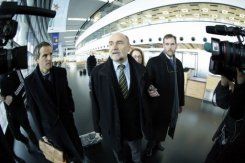 International Atomic Energy Agency chief inspector Herman Nackaerts (C) talks with journalists as he leaves for Iran on February 12, 2013 from Schwechat airport near Vienna, AustriaThe chief UN atomic inspector said Thursday that talks with Iran had failed again to reach a deal on enhanced inspections of Tehran's nuclear programme, two weeks before a major meeting with world powers.
International Atomic Energy Agency chief inspector Herman Nackaerts (C) talks with journalists as he leaves for Iran on February 12, 2013 from Schwechat airport near Vienna, AustriaThe chief UN atomic inspector said Thursday that talks with Iran had failed again to reach a deal on enhanced inspections of Tehran's nuclear programme, two weeks before a major meeting with world powers.
"We had discussions on the structured approach document but could not finalise the document," Herman Nackaerts of the International Atomic Energy Agency told reporters at Vienna airport after returning from Tehran.
"Our commitment to continued dialogue is unwavering. We will work hard now to resolve the remaining differences but time is needed to reflect on the way forward," he said.
"We haven't agreed yet on a date for the next meeting."
He declined to comment on whether the two sides had made any progress towards a deal, but Iran's envoy to the IAEA, Ali Asghar Soltanieh, on Wednesday was characteristically more upbeat.
"Some differences were resolved and agreement on some issues in the modality was reached," Soltanieh was quoted Wednesday by the Iranian news agency ISNA as saying.
The meeting was the latest in a string of attempts by the IAEA to press Iran to grant access to sites, scientists and documents that the agency believes may have been part of a covert nuclear weapons drive.
Iransays that the IAEA's allegations are based on flawed Western and Israeli intelligence -- which it has not been allowed to see -- and says it has never sought to develop the bomb.
This latest failure comes less than two weeks before talks between Iran and six world powers -- the United States, China, Russia, Britain, France and Germany -- in Kazakhstan on February 26.
These talks follow three rounds in 2012, the last in Moscow in June, at which the six, known as the P5+1, pressed Iran to scale back key areas of its nuclear programme.
Iran however walked away because the P5+1 stopped short of offering Tehran relief from UN Security Council and unilateral Western sanctions that last year began to cause major economic problems for the Persian Gulf country.
In particular the six want Iran to suspend the enrichment of uranium to purities of 20 percent, which for the international community is the most worrisome part of Iran's activities.
Iran's mastery of the technology to enrich to these levels takes it significantly closer to being able to purify the material further to 90 percent, the level for a nuclear weapon -- should Iran decide to do so.
Iransays that it is enriching to 20 percent in order to make fuel for a reactor producing nuclear medicines. It is also enriching to five percent for power generation, even though it has only one operating plant for this.
The six powers also want Tehran to shut the Fordo enrichment facility -- dug into a mountain near the holy city of Qom, making it difficult to destroy -- and to ship abroad its existing stockpile of 20-percent uranium.
The IAEA's latest quarterly report on Iran next week is expected to show that Iran has continued to increase its capacity to enrich, and to grow its stockpile of enriched uranium. Close attention will be paid to whether it has installed newer-generation machinery.
In November, Washington warned that if there was no progress with the IAEA, it would push for the 35-nation IAEA board at its next meeting from March 4-8 to take the rare step of referring Iran to the UN Security Council.
"The impression is that (China and Russia) are increasingly frustrated with Iran... There is some optimism" that they will join Western countries and support such a move, one Vienna diplomat told AFP last week.
The UN Security Council has already passed six resolutions calling on Iran to suspend all enrichment activities.
 В Атырау -10
В Атырау -10